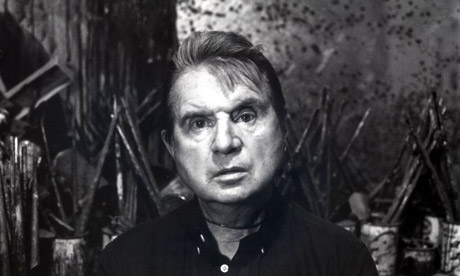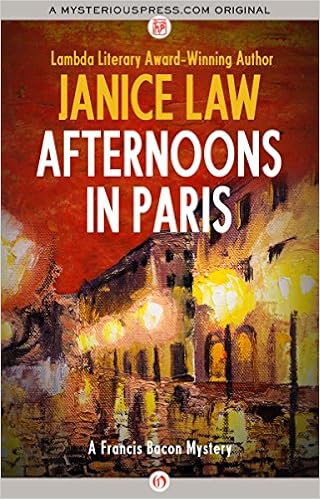All this talk of spies, and Russian manipulation, plots divers and devious, is enough to make more than a few of us nostalgic for the Cold War. My pal Carolyn sent me a link to a recent Dexter Filkins piece in The New Yorker which speculates 'nostalgic' ain't the half of it, the body count going up as scores are settled.
We're on shaky ground here, in the Twilight Zone between coincidence and conspiracy. The politically suspect have been raw meat for years, inside Russia, journalists a favorite target, but the received wisdom has always been that the security organs don't operate with impunity in the U.S. I'm not so sure. Historically, we've got the murder of Gen. Walter Krivitsky, in 1941. His death was ruled suicide, but informed opinion agrees that NKVD rigged it to look that way. (Krivitsky died six months after they got to Trotsky, in Mexico.) Then there's Laurence Duggan, who fell out of a 16th-story window in New York in 1948. He had a meeting scheduled with his Soviet control that day. You think to yourself, Okay, but that was Stalin, this isn't the old days, when Yezhov and Beria could conjure up triggermen like dragon's teeth. Then again, who exactly is Vladimir Putin if not a wolf in wolf's clothing?
What we're talking about is the possibility, at least, that Russian state security is fielding hit teams on American soil. In the past, these were proxy killings, and they took place in client states or satellites. Western and Eastern Europe, Latin America, Africa, Asia. Very seldom, if ever, would you take out the pros on either team, the agent-runners, KGB, CIA, the Brits, the Israelis. You compromised their assets, you sowed discord and misdirection, you put them at cross-purposes, but you didn't knock 'em off like gangland rivals. And we didn't go after targets in the Soviet Union, they didn't come after targets Stateside. That seemed to be the unspoken agreement, anyway. Professional courtesy. Elsewhere was fair game. Berlin, or Vienna. Helsinki, Athens, Istanbul. And the Third World? You couldn't even trust the water.
It all changed in late 2006, with the assassination of Alexander Litvinenko. We'd had the killing of Georgi Markov, the Bulgarian dissident, in the UK. This was back in 1978, the notorious poisoned pellet in an umbrella tip - Bulgaria's secret service, the DS, borrowed the toxin from KGB, it's thought. Nobody ever made the case, though. Markov was a one-off. (Not exactly. There was another Bulgarian, in Paris, ten days earlier.) Or maybe the DS operation was rogue? (Not that, either. There's good collateral KGB sponsored it.) In the event, the trail went cold. This isn't to say nobody cared about Markov, but it was a story that flared briefly, and petered out. We're talking about Bulgaria, after all. How many people can find it on a map? More to the point, Markov's murder didn't indicate a pattern. It was an anomaly. And then, almost thirty years later, Litvinenko. Another exotic poison, in this instance, polonium. A defector, a known enemy, a slanderer, and a personal insult to Vladimir Putin that the son-of-a-bitch is still walking around.
The issue for the Kremlin seems to be that people like Litvinenko, and the opposition politician Sergei Yushenkov, and the reporter Anna Politkovskaya, just won't shut up. The three of them are now dead, of course. The bone that got stuck in their throat appears to have been Chechnya. Chechen terrorists were blamed for the apartment bombings in Moscow and two other cities in 1999 that gave Putin political cover to jump-start the Second Chechen War. In a fourth city, Ryazan, a team of FSB covert operatives were arrested after planting explosives, and the story went round that all of the apartment bombings were a security service provovcation, a false-flag attack. Then there's the Moscow theater siege in 2002, which people have also suggested was a provocation, and there's the Beslan school hostage massacre in 2004. Three events pinned on Islamic jihadis from the Caucasus, and used to prosecute the war with increasing brutality - scorched earth, in effect - and three events possibly orchestrated or abetted by federal security agencies. The stories aren't going to stop, but they've become whispers and hearsay, their voices have been lost, along with Litvinenko, Yushenkov, and Politkovskaya.
Using state security, or the Mafia, or freelance private contractors, to settle up your debts can be habit-forming. You get a taste for it. And quite possibly, you get bolder, or maybe you just don't care if you leave your handwriting. When you come down to it, what's the point of intimidation, if you don't sign your name?
In his New Yorker piece, Dexter Filkins floats a few possibilities, U.S. targets, ex-pat critics of the Kremlin who wound up in the hospital, or dead. If targeted they were. It's a tough call. Guy gets drunk and chokes on a piece of chicken? Could happen. Guy gets beaten to death in a hotel room? Seems less like a happy accident. What about the guy who had a gun put to his head? Nobody murmured in your ear, "Michael Corleone sends his regards." There's nothing solid to go on. All we can say is, This happened before, and such-and-such didn't. We're left with supposition and suspicion.
Here's a supposition. Putin thinks he can get away with murder because he has, it's that simple. As for the niceties, or the courtesy, well. Chert vozmy. The devil take it. This is somebody who doesn't even have to pretend to courtesy. Still. It presents an uneven risk-benefit ratio. My guess is that it's more about, Who will rid me of this tempestuous priest? In other words, it isn't Putin's express bidding. He doesn't have to put pen to paper, or even raise his voice. Oligarchs and Mafia bosses kiss his ring. The thought is father to the deed.
One other thing. Rules of engagement aside, it seems awfully petty to put so much energy into hunting down a few loudmouths, mostly nuisance value, sticks and stones. You have to take yourself pretty seriously to take them so seriously. Which is I guess the point. We imagine that Power is the great engine, the dynamic that shapes men, and history. What if it's just vanity, or hurt feelings?
Showing posts with label NKVD. Show all posts
Showing posts with label NKVD. Show all posts
28 June 2017
Wet Work
Labels:
Cold War,
David Edgerley Gates,
FSB,
KGB,
mafia,
NKVD,
Russia,
Soviet Union,
Vladimir Putin
13 April 2017
"Afternoons in Paris" by Janice Law
by Eve Fisher
You remember Francis Bacon:
 No, not that one, this one:
No, not that one, this one: 
Francis Bacon, artist. Francis Bacon, gambler. Francis Bacon, bon vivant. Francis Bacon, gay, asthmatic, Irish, autodidact, devoted to his Nan, louche, rough, crazy...
Well, HE'S BACK!!!!
 Yes, my favorite gay artist adventurer is back in Janice Law's "Afternoons in Paris". Francis is 18 and in the City of Lights, and very glad to be there after the craziness of Berlin (read Janice's "Nights in Berlin": the book and David Edgerley Gates' review). Now he's on his own, working for a decorator/designer by day (the somewhat susceptible Armand), visiting galleries with the motherly Madame Dumoulin, and cruising the city by night with the totally unreliable Pyotr, a Russian emigre who, like Francis, has a taste for quick hook-ups and rough trade.
Yes, my favorite gay artist adventurer is back in Janice Law's "Afternoons in Paris". Francis is 18 and in the City of Lights, and very glad to be there after the craziness of Berlin (read Janice's "Nights in Berlin": the book and David Edgerley Gates' review). Now he's on his own, working for a decorator/designer by day (the somewhat susceptible Armand), visiting galleries with the motherly Madame Dumoulin, and cruising the city by night with the totally unreliable Pyotr, a Russian emigre who, like Francis, has a taste for quick hook-ups and rough trade.Pyotr has two Russian friends, Igor, who's sinister, and Lev, who's quickly assassinated. After getting robbed (by Pyotr), beaten up (by 'Cossacks') in Montparnasse, and finding two more waiting to do the same at his lodgings, Francis tries to avoid Russians by moving in with Madame Dumoulin and her brother, Jules, who needs a caretaker. Well, it could be argued that Francis is the last person to be anyone's companion/caretaker, but our boy knows how to be appreciative. And Jules, although a traumatized WW1 veteran, is an innocent (at least compared to Francis): much like Mr. Dick in "David Copperfield", he builds complex machines and flies kites. Francis can enjoy both.
And then Jules gets a chance to design machines for the theatre group Les Mortes Immortels, and it's back to Paris for all. Jules' machines are the best part of a production about as audience-friendly as "Finnegan's Wake"; that and the character of Human Hope, played by Inessa, a Russian Helen of Troy who enraptures everyone around her. Except for those who are using her.
Russians are everywhere, and they're all dangerous: Pyotr; the NKVD assassin Alexi; the NKVD blackmailer Anoshkin; Inessa's missing brother, Pavel. And, wouldn't you know it, who's up to his neck in all of this but Francis' Uncle Lastings? Now known as Claude, art dealer and bon-vivant, but still up to his neck in intrigue, scams, sex, and spying. Francis has a lot of fast talking, fast running, fast thinking, and fast acting to do to survive...
 |
| Soutine's Chemin de la Fontaine des Tins at Ceret - Wikipedia |
 |
| Nan |
Emotionally, Francis is still developing, or is he? At one point he says, regarding his commitment to Jules: "I had promised Jules, and I believe in friendship. It tends to be more stable than romance." Not to mention family. As he writes to Nan about his uncle, "I know this is a surprise, but He Who Must Not be Named has secured a job for me, and this time, I have asked to be paid half in advance. You can see I am getting wise to the ways of the world." In fact, the only person Francis trusts implicitly is Nan, in "Afternoons in Paris", "Nights in Berlin", "Fires of London", "The Prisoner of the Riviera", "Moon over Tangier" and in real life. She will always be the most stable person in his life, not excepting himself.
But even at 18, Francis is already witty, sarcastic, honest, observant, hungry, lustful, reckless, and utterly sure that he will never be among the bourgeoisie. (And how right he is.) He always gives a master class in the art of survival. Francis Bacon and Paris in the 20s - it's hard to ask for anything more.
Labels:
agents,
Berlin,
Francis Bacon,
Henri Matisse,
Janice Law,
murder,
NKVD,
Paris,
Russia,
spies
Subscribe to:
Comments (Atom)